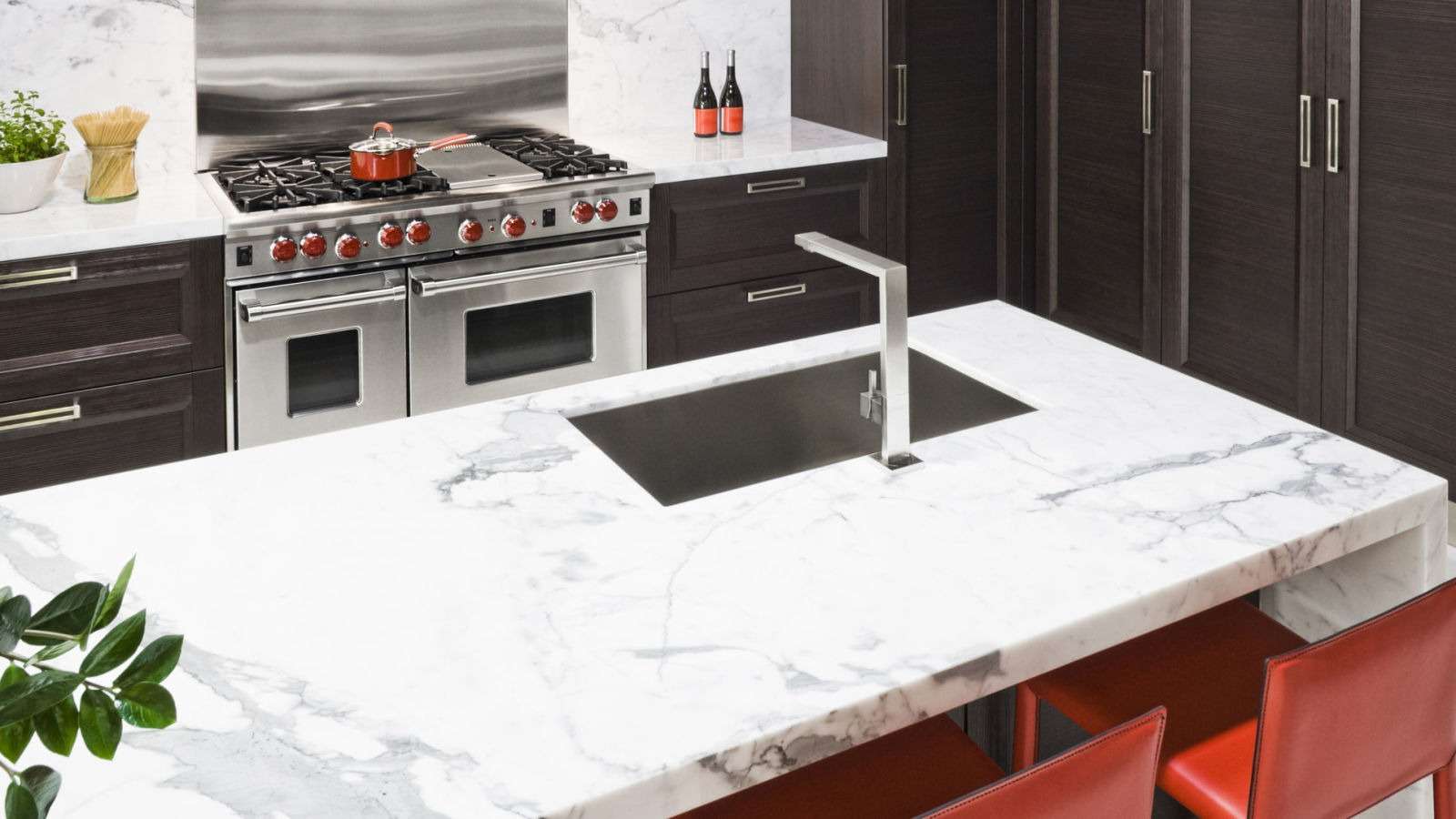In the realm of kitchen design, the kitchen countertop stands as a defining feature that seamlessly blends functionality with aesthetic appeal. It’s where culinary creativity takes shape, from the precise chopping of ingredients to the artful presentation of dishes. Beyond its practical utility, the kitchen countertop is a reflection of personal style—a canvas on which the essence of your kitchen is showcased. As you embark on the journey of selecting the perfect kitchen countertop, consider the synergy it creates with your cabinetry, flooring, and overall kitchen theme. The right choice can transform your cooking space into a harmonious and inviting environment.
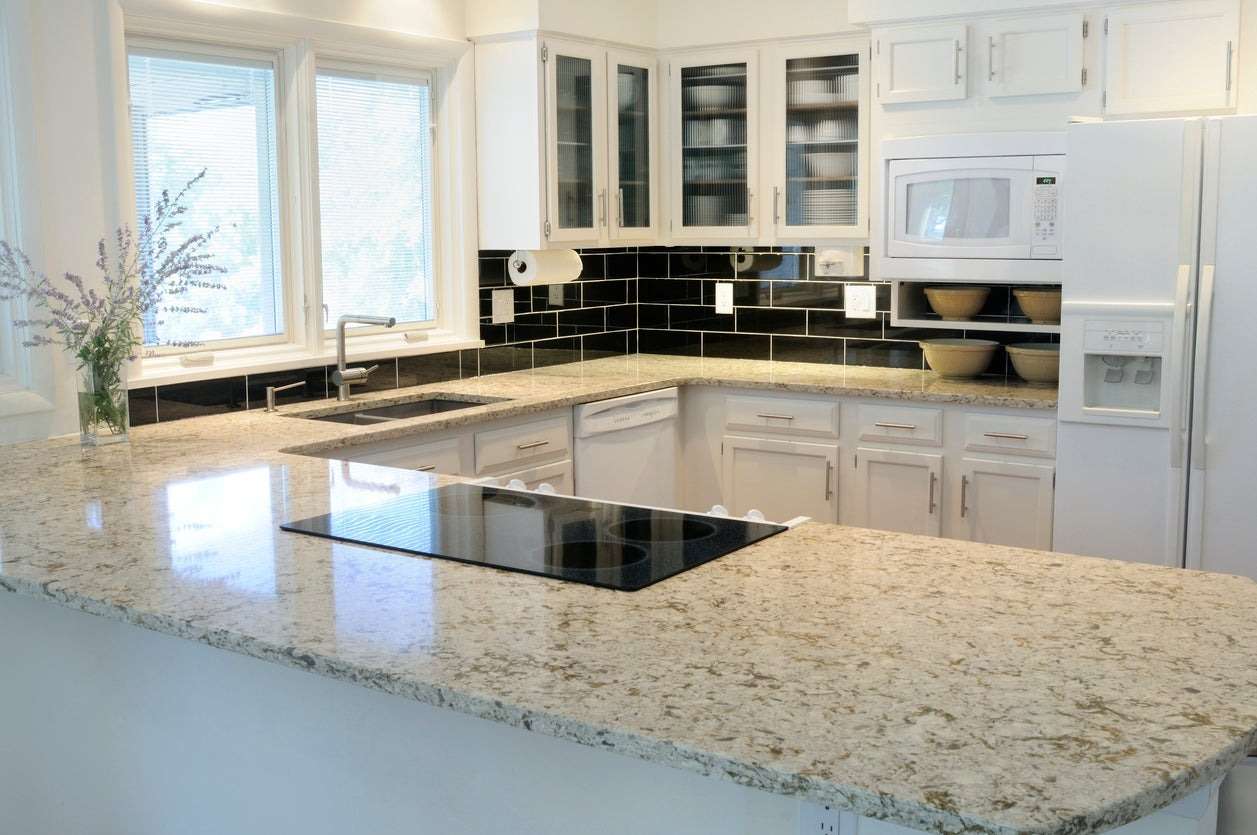
What Is a Kitchen Countertop?
A kitchen countertop is more than just a surface for chopping vegetables or preparing meals; it’s the heartbeat of your kitchen. Picture a cozy family breakfast with pancakes flipped on the granite counter, or a late-night conversation with friends gathered around a quartz island. The countertop is where memories are made, making it an integral part of your home.
Beyond its functionality, the countertop is a design canvas. Think of it as the backdrop against which your kitchen aesthetic unfolds. Whether you prefer the elegance of granite, the modern allure of quartz, or the versatility of laminate, your countertop choice reflects your style and sets the tone for the entire kitchen.
Pick the Right Materials to Build Your Kitchen Countertop
Choosing the right material for your kitchen countertop involves more than aesthetics; it’s about finding the perfect balance between form and function. Let’s delve deeper into the nuances of each popular material, understanding their unique characteristics and how they align with your kitchen needs.
Granite Countertops
Granite countertops, with their natural elegance and durability, are a timeless choice. The unique patterns and colors add a touch of sophistication to any kitchen. Beyond aesthetics, granite stands out for its resistance to scratches and heat, making it a practical choice for avid cooks. However, it’s essential to be mindful of periodic sealing requirements to maintain its stain resistance.
Example Scenario: Imagine a family passionate about cooking, where the robustness of granite allows them to experiment with various culinary endeavors without worrying about damaging the countertop.
Quartz Countertops
Quartz countertops, known for their versatility and low maintenance, offer a wide array of colors and patterns. Engineered from crushed quartz crystals and resin, they are non-porous, making them resistant to stains and bacteria. Quartz countertops don’t require periodic sealing, contributing to their hassle-free upkeep. However, it’s crucial to note that they may not be entirely heat-resistant.
Example Scenario: Envision a modern kitchen where a busy family benefits from the easy maintenance of quartz, providing a sleek and clean surface for daily activities.
Laminate Countertops
Laminate countertops, appreciated for their affordability and diverse design options, are a popular choice for budget-conscious homeowners. While laminate is relatively easy to install and comes in various patterns, it may not be as durable as natural stone or quartz. Heat exposure and scratches can pose challenges, emphasizing the need for careful handling.
Example Scenario: Picture a young couple setting up their first home, where the versatility and cost-effectiveness of laminate allow them to achieve a stylish kitchen within their budget.
As you weigh these options, consider your lifestyle, the level of maintenance you are comfortable with, and the overall aesthetic you wish to achieve. Each material has its unique qualities, and the right choice depends on finding the balance that aligns with your practical needs and design preferences. The kitchen countertop is not just a surface; it’s a statement piece that adds character to your kitchen, making the selection process an exciting journey in crafting the heart of your home.
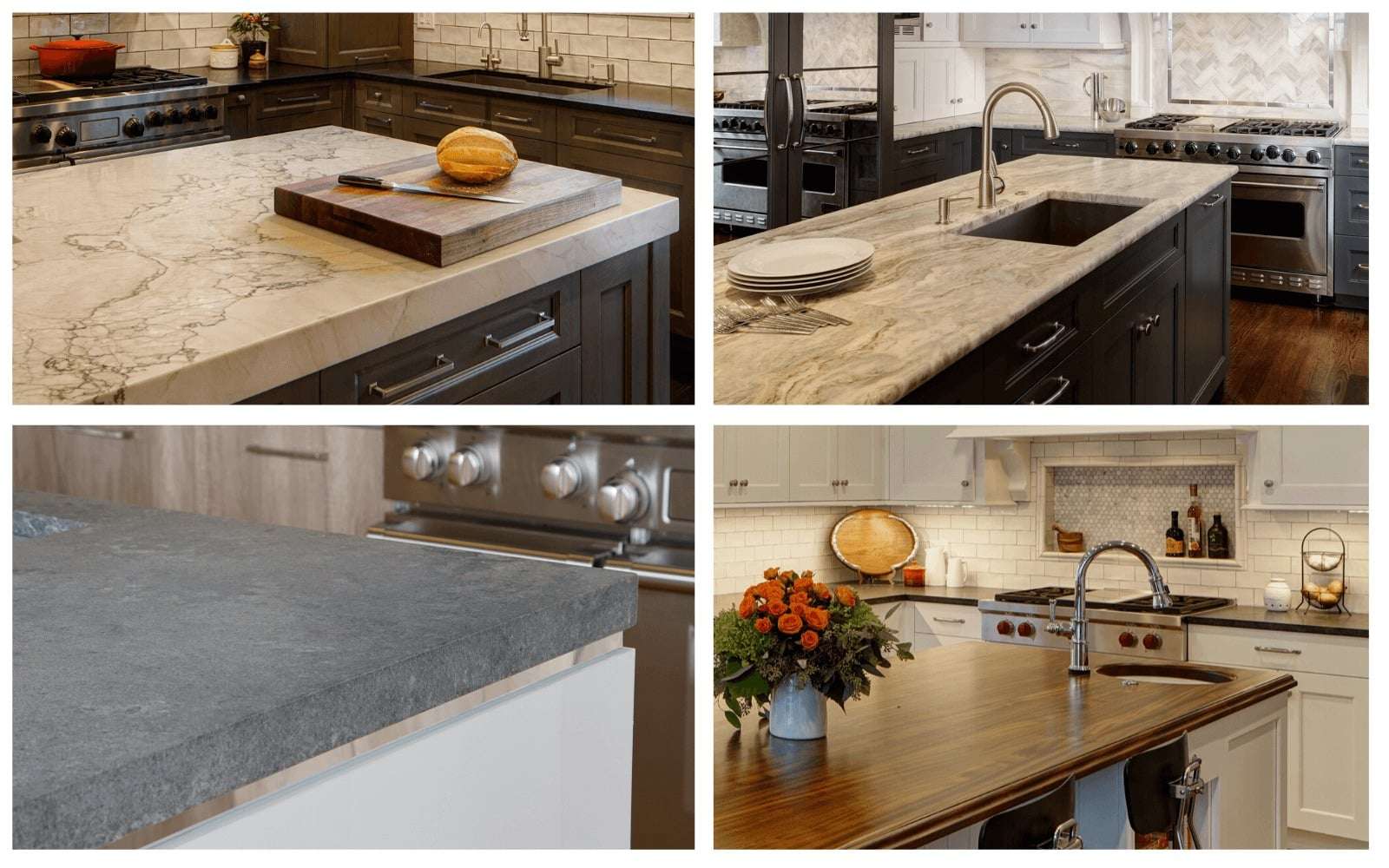
Pros and Cons of Countertop Materials
Granite Countertops
Pros:
- Timeless Elegance: Granite’s natural beauty with intricate patterns and variations adds a touch of timeless elegance to your kitchen.
- Durability: Known for its durability, granite can withstand the wear and tear of a busy kitchen.
- Heat Resistance: It’s heat-resistant, making it an excellent choice for avid cooks who frequently use hot pans.
Cons:
- Cost: Granite tends to be on the pricier side compared to other materials.
- Maintenance: While it’s relatively low-maintenance, periodic sealing is necessary to prevent staining.
Real-life Scenario: Imagine a bustling holiday season with family gatherings. The granite countertop becomes the stage for baking cookies and preparing festive feasts, showcasing both its beauty and functionality.
Quartz Countertops
Pros:
- Versatility: Quartz offers a vast array of colors and patterns, allowing you to find the perfect match for your kitchen.
- Low Maintenance: It’s non-porous, resisting stains and bacteria, and doesn’t require periodic sealing.
- Durability: Quartz is durable and can withstand the demands of a busy kitchen.
Cons:
- Cost: Quartz can be pricier than other materials.
- Not Heat-Resistant: While it’s durable, it’s not entirely heat-resistant, so using trivets is recommended.
Real-life Scenario: Picture a modern kitchen with sleek quartz countertops hosting a lively dinner party. The ease of cleaning and resistance to stains make cleanup a breeze, allowing you to enjoy the company of your guests.
Laminate Countertops
Pros:
- Affordability: Laminate is a budget-friendly option, making it accessible to a wide range of homeowners.
- Variety: It comes in various designs and patterns, offering versatility in matching your kitchen’s style.
- Easy Installation: Laminate countertops are relatively easy to install.
Cons:
- Not Heat-Resistant: Laminate is susceptible to damage from hot pans, and using trivets is recommended.
- Durability: While durable, it may not withstand impacts or scratches as well as other materials.
Real-life Scenario: Consider a starter home where a laminate countertop becomes the canvas for a young family’s culinary adventures. Its affordability allows for stylish design without breaking the budget.
Choosing the right material involves weighing these factors against your lifestyle, budget, and design preferences.
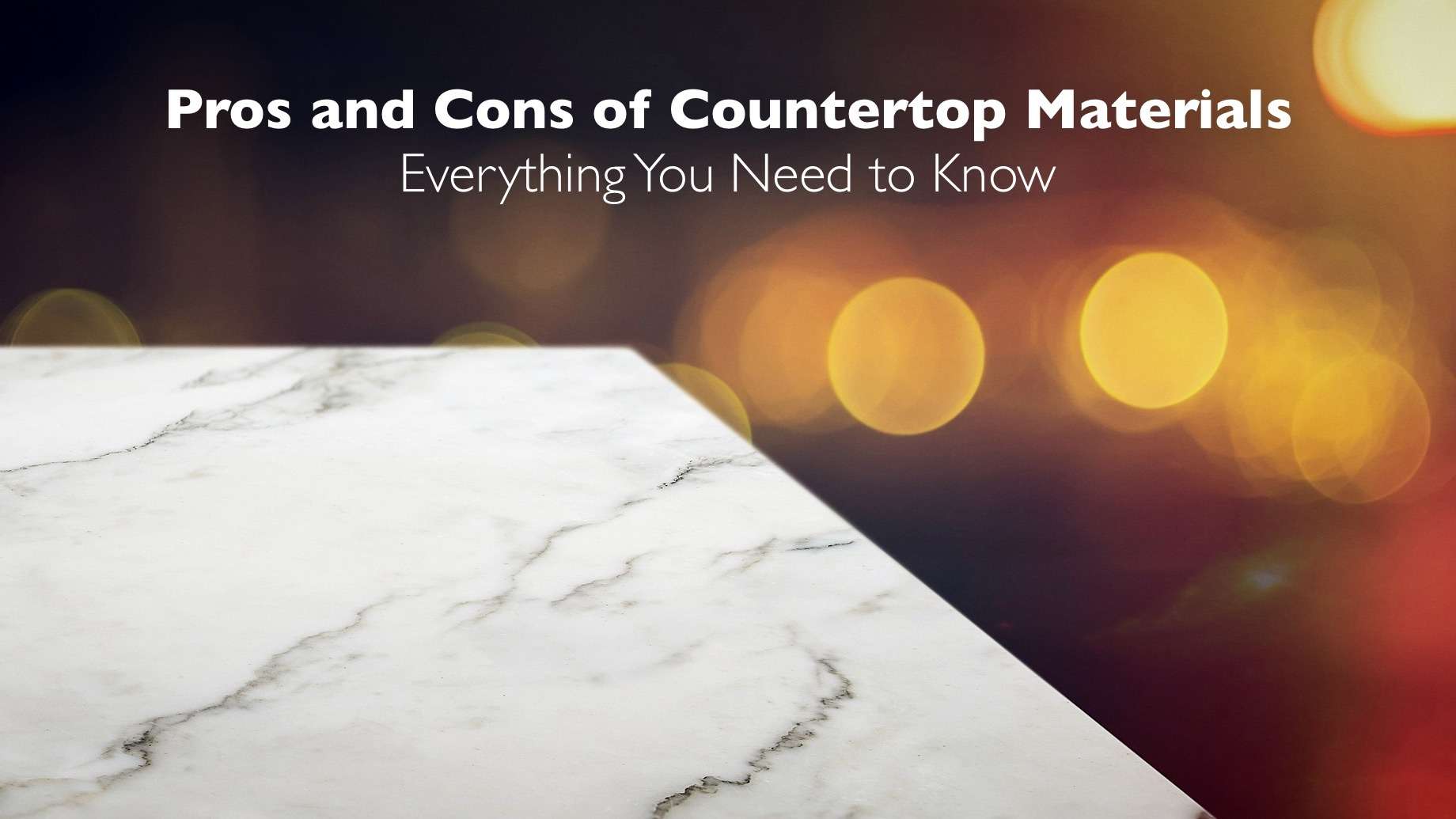
Tips For Maintaining Your Kitchen Countertop
Maintaining your kitchen countertop is essential for preserving its beauty and functionality. Let’s delve into specific tips for different countertop materials:
Granite Countertops Maintenance Tips
1. Prompt Cleaning:
Granite is porous and can absorb liquids, leading to stains. Wipe spills promptly, especially those from acidic substances like tomato sauce or wine.
Example: Imagine accidentally spilling red wine during a dinner party. Swiftly wiping it with a soft cloth prevents a permanent stain, preserving the granite’s pristine appearance.
2. Daily Cleaning:
For daily cleaning, use a mild detergent and a soft cloth. Avoid harsh chemicals or abrasive cleaners that can damage the surface over time.
Example: Picture a busy morning with breakfast preparations. A gentle wipe with a soft cloth after slicing fruit ensures the granite remains a hygienic surface.
3. Resealing:
Periodically reseal the surface to maintain its protective layer. The frequency depends on usage but generally ranges from 1 to 2 years.
Example: Consider a kitchen where granite countertops endure daily cooking. Regular resealing becomes a proactive measure to sustain the stone’s longevity.
Quartz Countertops Maintenance Tips
1. Gentle Cleaning:
Quartz countertops are non-porous, making them resistant to stains. Wipe spills with a soft cloth and mild dish soap to keep the surface clean.
Example: Picture a family baking session with kids. Accidental spills of flour or batter on the quartz surface are effortlessly wiped away, ensuring a spotless kitchen.
2. Avoid Abrasives:
Avoid abrasive cleaners, as they can damage the surface. Stick to non-abrasive options for regular cleaning.
Example: In a kitchen where daily activities involve chopping and slicing, the gentle touch of a non-abrasive cleaner preserves the quartz’s smooth finish.
3. Use Cutting Boards:
While quartz is resistant to scratches, it’s advisable to use cutting boards to further protect the surface.
Example: Envision a weekend cooking marathon. Using cutting boards prevents direct contact with knives, maintaining the quartz’s scratch-resistant quality.
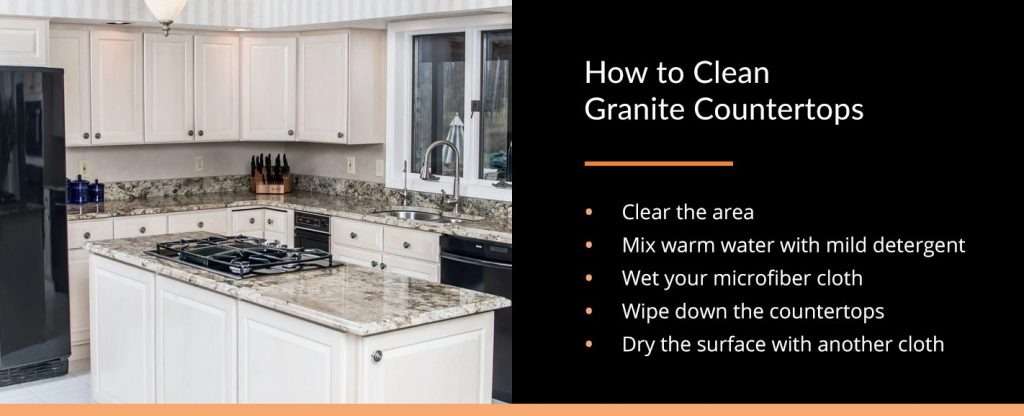
Laminate Countertops Maintenance Tips
1. Mild Cleaners:
Clean laminate countertops with a mild household cleaner. Avoid harsh chemicals that can damage the surface.
Example: In a kitchen where a variety of ingredients are used daily, a mild cleaner ensures the laminate remains free from residue and stains.
2. Avoid Heat Exposure:
Avoid placing hot pans directly on the surface, as laminate can be sensitive to heat. Use trivets or hot pads to protect against heat damage.
Example: Picture a family dinner where a hot pot is taken directly from the stove. Placing it on a trivet protects the laminate, preventing any potential damage.
3. Use Cutting Boards:
To prevent scratches, use cutting boards when chopping or slicing. While laminate is durable, it’s not entirely scratch-resistant.
Example: In a kitchen where cooking involves a variety of utensils, the use of cutting boards becomes a simple yet effective way to maintain the laminate’s appearance.
By following these maintenance tips tailored to your countertop material, you can ensure its longevity and keep it looking as good as new.
FAQs
Q: How often should I seal my granite countertop?
A: The frequency of sealing your granite countertop depends on usage. In a typical kitchen environment, sealing every 1 to 2 years is recommended. However, high-use areas might require more frequent sealing.
Example: Imagine a kitchen where daily cooking involves spices and oils. More frequent sealing becomes a proactive measure to combat potential stains.
Q: Can I place hot pans directly on a quartz countertop?
A: While quartz is heat-resistant, it’s advisable to use trivets or hot pads to protect the surface from extreme heat. Sudden changes in temperature, such as placing a hot pan directly on the surface, may cause thermal shock.
Example: Picture a weekend cooking experiment where a hot pan is placed directly on the quartz surface. The precaution of using a trivet avoids any potential thermal shock.
Q: Are laminate countertops durable?
A: Laminate countertops are a cost-effective choice but may not be as durable as natural stone or quartz. While they resist stains and scratches to some extent, it’s essential to handle them with care to prevent damage.
Example: In a kitchen with laminate countertops, a family learns to balance functionality and care. The durability of laminate becomes apparent through mindful usage.
